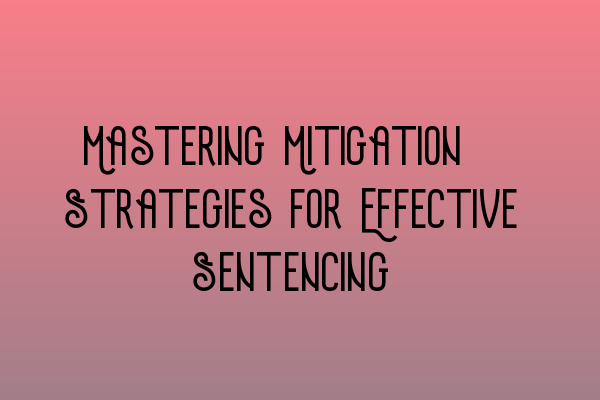Mastering Mitigation: Strategies for Effective Sentencing
As criminal law practitioners, one of the key aspects of our work is the process of mitigation during sentencing. The art of presenting persuasive arguments to mitigate the severity of a sentence imposes substantial responsibility on us as legal professionals. In this blog post, we will explore strategies for mastering mitigation and achieving effective sentencing outcomes.
The Importance of Mitigation
Mitigation plays a crucial role in criminal proceedings as it allows us to present a comprehensive picture of our client as an individual and their circumstances. By focusing on relevant factors, we aim to convince the court to impose a sentence that is fair and proportionate. Effective mitigation can mean the difference between a lenient sentence and a punitive one.
So, how can we master the art of mitigation? Let’s delve into some key strategies:
1. Thorough Case Preparation
Before entering the courtroom, it is pivotal to thoroughly prepare the case and gather all relevant information. This includes conducting detailed interviews with our client to understand their personal background, history, and any mitigating factors that may be applied.
Related Article: SQE 1 Practice Exam Questions
2. Understanding Sentencing Guidelines
Staying up-to-date with the latest sentencing guidelines is essential in determining an appropriate strategy for mitigation. By understanding the relevant guidelines, we can effectively argue our client’s case within the established framework.
Related Article: SQE 1 Practice Mocks FLK1 FLK2
3. Presenting a Compelling Narrative
One of the most influential strategies for effective mitigation is presenting a compelling narrative that humanizes our client. By emphasizing their positive qualities, personal circumstances, and any remorse or rehabilitation efforts, we can create empathy and understanding in the courtroom.
Related Article: SQE 2 Preparation Courses
4. Expert Witness Testimony
Utilizing expert witness testimony can significantly enhance the strength of our mitigation arguments. Experts in relevant fields, such as psychiatrists or addiction specialists, can provide valuable insights into our client’s situation, highlighting factors that may mitigate their culpability or suggest appropriate rehabilitative measures.
Related Article: SQE 1 Preparation Courses
5. Addressing the Impact on the Victim
An effective strategy for mitigation includes demonstrating genuine remorse and an understanding of the negative consequences endured by the victim. By acknowledging the harm caused and presenting measures aimed at reparations, we can show our client’s commitment to taking responsibility and making amends.
6. Aligning with Sentencing Objectives
In our pursuit of effective mitigation, it is essential to align our arguments with the objectives of sentencing. These objectives typically include punishment, deterrence, and rehabilitation. By demonstrating how our proposed sentence achieves these objectives, we can persuade the court to impose a fair and balanced outcome.
Related Article: SRA SQE Exam Dates
Conclusion
In conclusion, mastering mitigation is a skill that requires thorough preparation, knowledge of the sentencing framework, and the ability to present compelling arguments. By employing these strategies, we can effectively advocate for our clients and secure favorable sentencing outcomes.
Remember, the process of mitigation is complex and ever-evolving. Stay updated with the latest developments in criminal law and ensure continuous professional development to enhance your skills as a criminal law practitioner.
